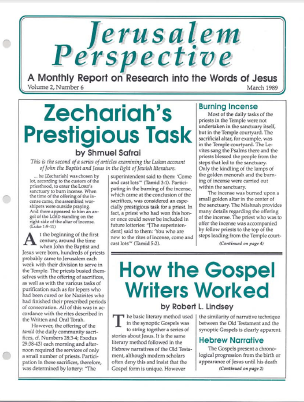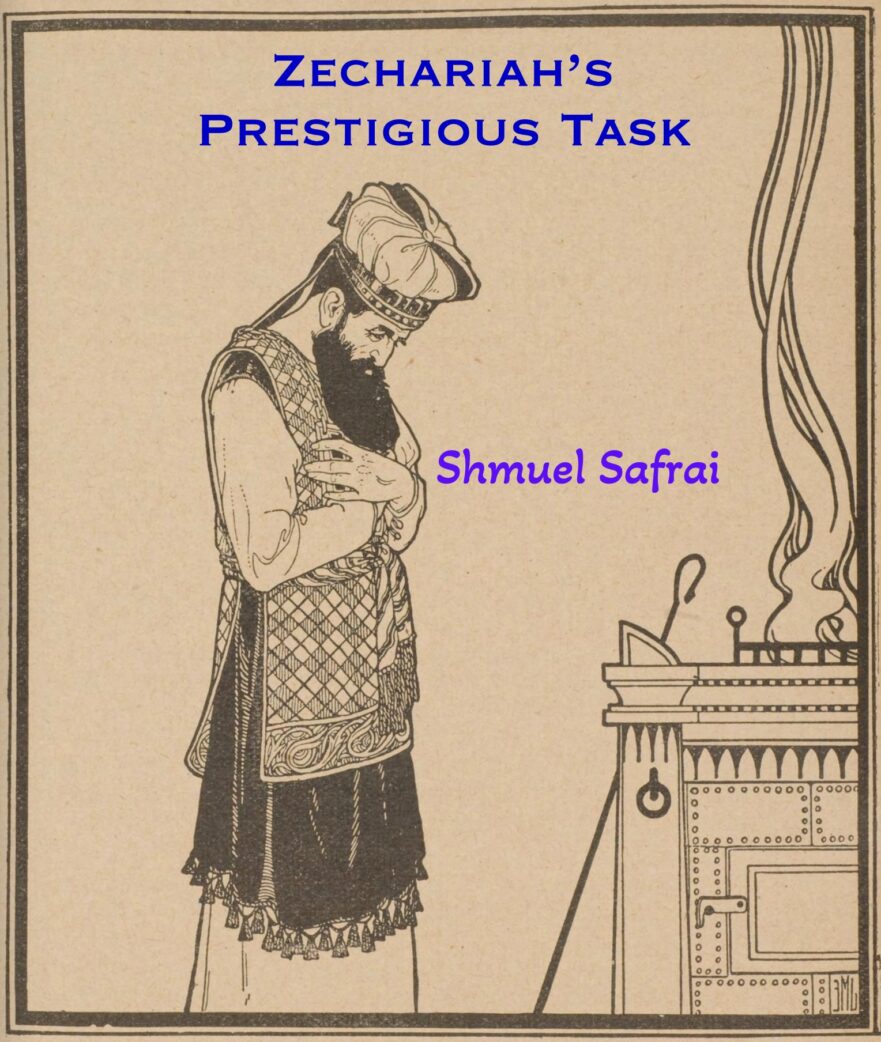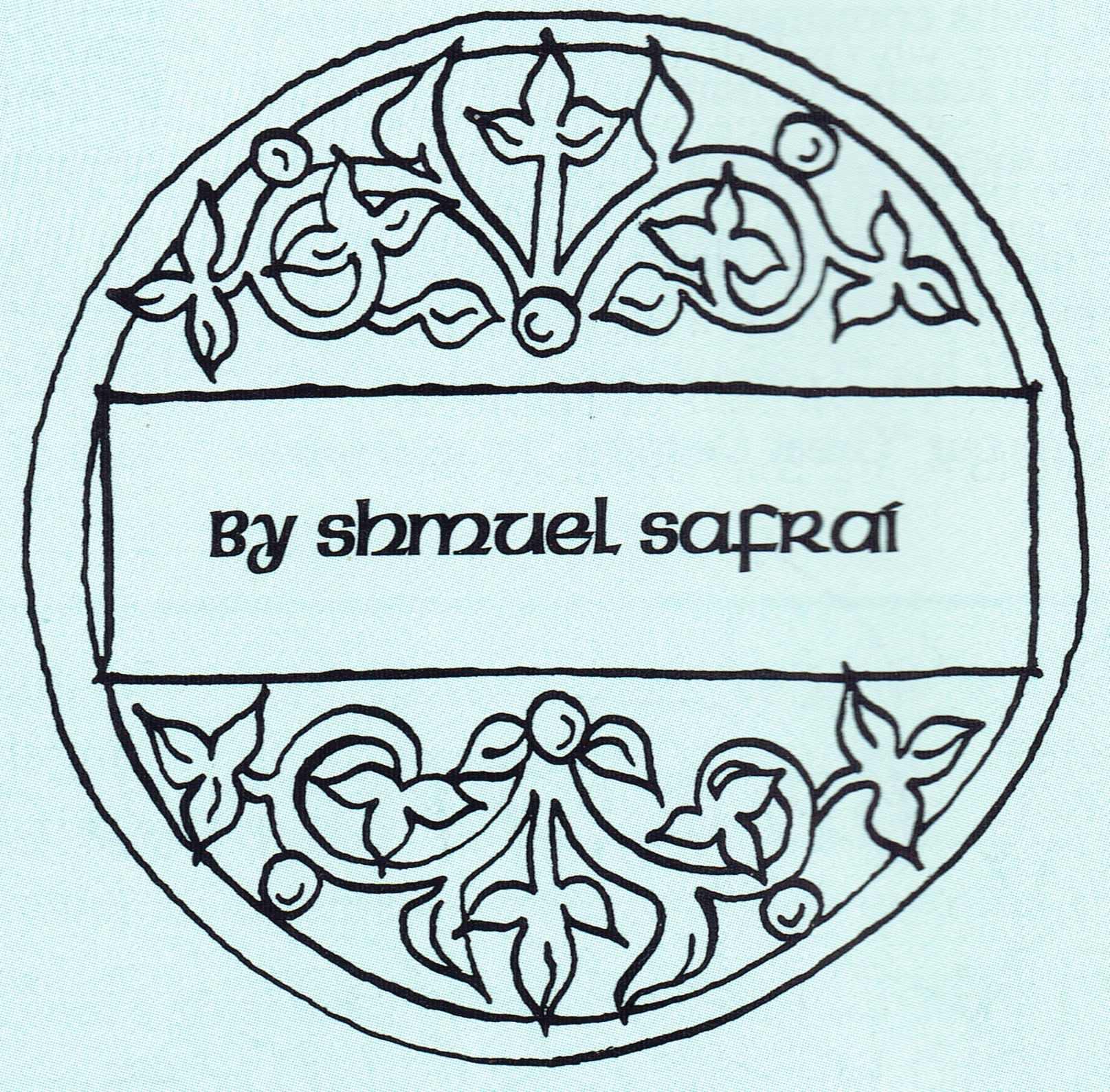In this series Professor Shmuel Safrai introduces readers to several prominent priests—descendants of Aaron, the brother of Moses—who play a role in the New Testament. To read more articles in the New Testament Priests series, click here.
He [Zechariah] was chosen by lot, according to the custom of the priesthood, to enter the LORD’s sanctuary to burn incense. When the time of the offering of the incense came, the assembled worshipers were outside praying. And there appeared to him an angel of the LORD standing on the right side of the altar of incense. (Luke 1:9-11)
At the beginning of the first century, around the time when John the Baptist and Jesus were born, hundreds of priests probably came to Jerusalem each week with their division to serve in the temple. The priests busied themselves with the offering of sacrifices, as well as with various tasks of purification, such as for lepers who had been cured or for Nazirites who had finished their prescribed periods of consecration. All of this was in accordance with the rites described in the Written Torah and Oral Torah.
However, the offering of the tamid (the daily community sacrifices, cf. Num. 28:3-4; Exod. 29:38-43 ) each morning and afternoon required the services of only a small number of priests. Participation in these sacrifices, therefore, was determined by lottery: “The superintendent said to them: ‘Come and cast lots’” (Mishnah, Tamid 3:1). Participating in the burning of the incense, which came at the conclusion of the sacrifices, was considered an especially prestigious task for a priest. In fact, a priest who had won this honor once could never be included in future lotteries: “[The superintendent] said to them: ‘You who are new to the rites of incense, come and cast lots’” (Mishnah, Tamid 5:2).

Burning Incense
Most of the daily tasks of the priests in the temple were not undertaken in the sanctuary itself, but in the temple courtyard. The sacrificial altar, for example, was in the temple courtyard. The Levites sang the Psalms there and the priests blessed the people from the steps that led to the sanctuary. Only the kindling of the lamps of the golden menorah and the burning of incense were carried out within the sanctuary.
The incense was burned upon a small golden altar in the center of the sanctuary. The Mishnah provides many details regarding the offering of the incense. The priest who was to offer the incense was accompanied by fellow priests to the top of the steps leading from the temple courtyard to the sanctuary. He entered the sanctuary alone, the other priests descending the steps to wait with the crowd assembled in the courtyard: “When all had gone he offered the incense, prostrated himself [in adoration] and went out [of the sanctuary]” (Mishnah, Tamid 6:3).
A Vision
It was not unknown for a priest to see a vision or hear a heavenly voice in the sanctuary at the time of the incense offering. Josephus relates that while the high priest and ruler John Hyrcanus was offering incense in the sanctuary, he heard a voice proclaiming that his sons had just defeated the Syrian king Antiochus (Antiq. 13:282).
Another heavenly voice that was heard at the incense burning announced the murder of Roman emperor Gaius Caligula. Because of his death (41 C.E.), Caligula’s decree that his statue be erected in the Jerusalem temple was cancelled (Tosefta, Sotah 13:6).
The most striking example of a vision at the incense offering is that of Shim’on the Righteous, a high priest and the earliest (circa 200 B.C.E.) sage known in rabbinic literature:
Shim’on the Righteous served Israel as high priest for forty years. In his last year he said to them: “This year I will die.”
They said to him: “How do you know this?”
He said to them: “Each year [on the Day of Atonement] when I entered the Holy of Holies [to offer incense] an old man dressed in white would enter with me and leave with me. This year, he entered with me but did not leave with me.” (Jerusalem Talmud, Yoma 42c)
Morning and Afternoon
The burning of the incense was considered the climax of all the activities connected with the tamid. As we noted, the priest offering the incense entered the sanctuary alone. A great crowd, made up of those who had brought sacrifices to the temple, as well as of interested spectators, awaited him in the temple courtyard. When he returned from the sanctuary, he stood on the steps leading to the courtyard and, together with some of the other priests, blessed the assembled crowd.
The incense offered at the afternoon tamid was considered to be of greater importance than that offered at the morning service: “The golden altar is dedicated only by the incense of spices [offered in the afternoon]” (Mishnah, Menahot 4:4). In other words, if a break occurred in the temple worship, for instance such as that during the persecution accompanying the decrees of Antiochus IV (167-164 B.C.E.), the worship was restarted with the afternoon service rather than the morning service.
A number of sources also mention the prayers of people outside of Jerusalem at the time when the afternoon incense was being offered in the temple, for example, Judith’s supplication in her hometown of Bethulia for deliverance from a besieging army (Judith 9:1).
Luke does not state whether the vision of Zechariah took place during the morning or afternoon incense burning ceremony. However, since the burning of the afternoon incense was the more important, it would seem that all the visions mentioned above, including that of Zechariah, occurred at the afternoon ceremony.
Comment by David Bivin (Oct. 24, 2012): For an important article on the same Lukan passage, see Randall Buth’s “What Is the Priest Doing? Common Sense and Culture.”

Paid Content
Premium Members and Friends of JP must be logged in to access this content: Login
If you do not have a paid subscription, please consider registering as a Premium Member starting at $10/month (paid monthly) or only $5/month (paid annually): Register
One Time Purchase Rather Than Membership
Rather than purchasing a membership subscription, you may purchase access to this single page for $1.99 USD. To purchase access we strongly encourage users to first register for a free account with JP (Register), which will make the process of accessing your purchase much simpler. Once you have registered you may login and purchase access to this page at this link:




![Shmuel Safrai [1919-2003]](https://www.jerusalemperspective.com/wp-content/uploads/userphoto/20.jpg)




























































































